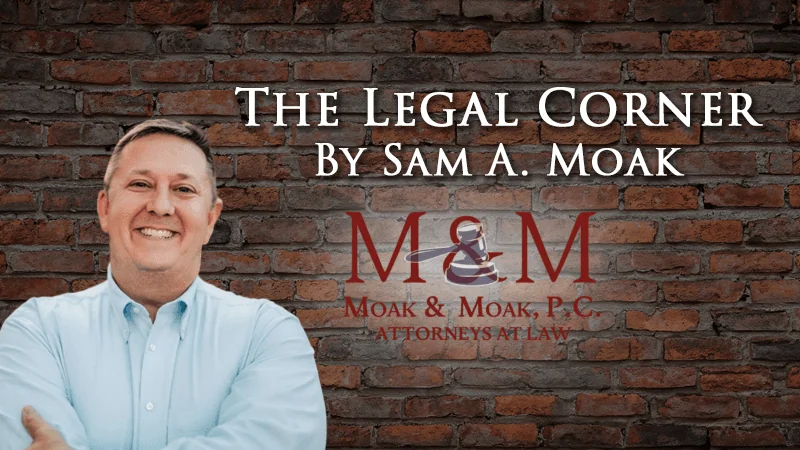The information in this column is not intended as legal advice but to provide a general understanding of the law. Some of the information in this column was prepared by the State Bar of Texas and is reprinted in this column with permission. Any readers with a legal problem, including those whose questions are addressed here, should consult an attorney for advice on their particular circumstances.
Everyone should have a will. You may think this is just more fluff from an attorney trying to justify his existence. However, our court system is full of lawsuits in which heirs are arguing over someone’s estate. Many of these lawsuits are the result of someone dying without a Last Will and thus giving no direction on how his or her estate was to be divided. This week I will point out some of the disadvantages of dying without a written Last Will and Testament.
If a person dies without a Last Will and Testament, Texas law dictates the disposition of his or her property. The public policy of statutes governing the intestate distribution of property is to provide for the orderly distribution of property at death. Because one usually has an idea of how he or she would like his or her property to pass to others, undesired results can arise if he or she dies without a Will. The law does not play favorites, so the distribution is by degree of kinship to the decedent, not by how close or wonderful one was to the decedent. Dying without a Will may trigger undesired results such as the property not passing to the heirs as the decedent wished and unexpected costs and delays.
For example, very often one spouse may prefer to leave everything to the surviving spouse who will provide for and take care of the children, but this may not happen if there is no written Last Will and Testament. In families with “your, mine and our” children, the surviving spouse receives only his or her one-half share of the community property, including the family home; only one-third of any separate personal property; and, an estate for life in one-third of any separate real property(land). The remainder of the property would pass to the decedent’s children. If there is any animosity between, for example, the surviving spouse and the deceased spouse’s children by a prior marriage (who are now co-owners of property), conflicts or disputes may arise. Surely this is not what the deceased spouse wanted.
Another example of unintended results of dying without a Last Will and Testament relates to the treatment of lifetime gifts to heirs. Texas law presumes that a gift to an heir is not an advancement of his or her inheritance. This may present a problem where a parent with two children makes a lifetime gift of a sizeable part (say, one-half) of the estate to one child (perhaps to help the child start a business or purchase a home) with the understanding that the gift is an advancement of his or her inheritance. If that parent then dies without a Will ( or the Will does not address this) and is not survived by a spouse, the remaining one-half of the estate is divided equally among the two children. The child who received the lifetime gift in effect takes three-fourths of the total estate, and the other receives only one-fourth instead of one-half, unless an advancement of the one child’s inheritance can be proved in court.
If the most special people in a person’s life are not among those who would be his or her heirs-at-law, they will not share in the estate if he or she dies without a Will. If an unmarried person dies without a Will, friends or companions will inherit nothing. Thus, a devoted friend, who perhaps cared for the decedent for years, will not inherit property, no matter how unfair it might seem, unless the friend is provided for in the decedent’s Will. Also, without a written Last Will and Testament, property cannot pass to a charitable organization, no matter how committed the decedent was to its purpose.
In Texas, there is no forced heirship. In other words, a parent is not required to leave property to his or her children. However, one cannot disinherit heirs if he or she dies without a written Will stating the disinheritence. Under the intestate distribution statutes, property may pass to undesired heirs instead of those the decedent would have chosen.
Securing the services of an attorney to help draft your estate plan and ensure that it is properly formalized, can avoid confusion, expenses and a lawsuit in the future.
Sam A. Moak is an attorney with the Huntsville law firm of Moak & Moak, P.C. He is licensed to practice in all fields of law by the Supreme Court of Texas, is a Member of the State Bar College, and is a member of the Real Estate, Probate and Trust Law Section of the State Bar of Texas. www.moakandmoak.com


